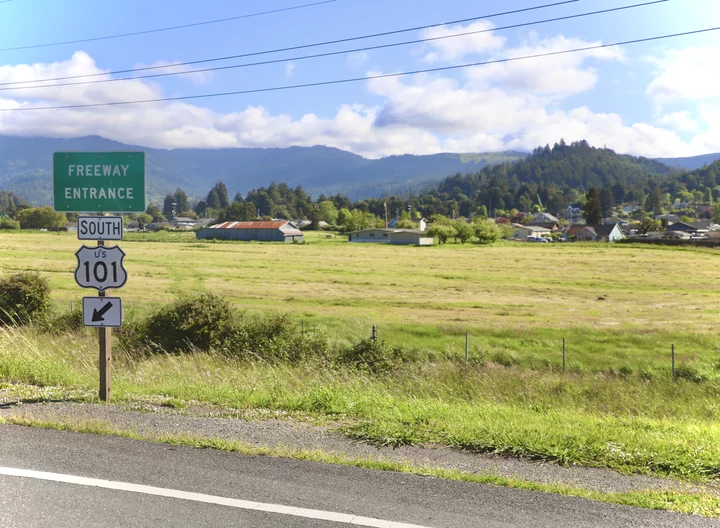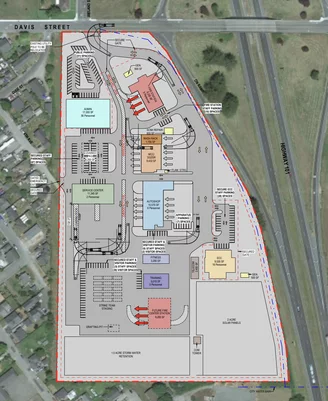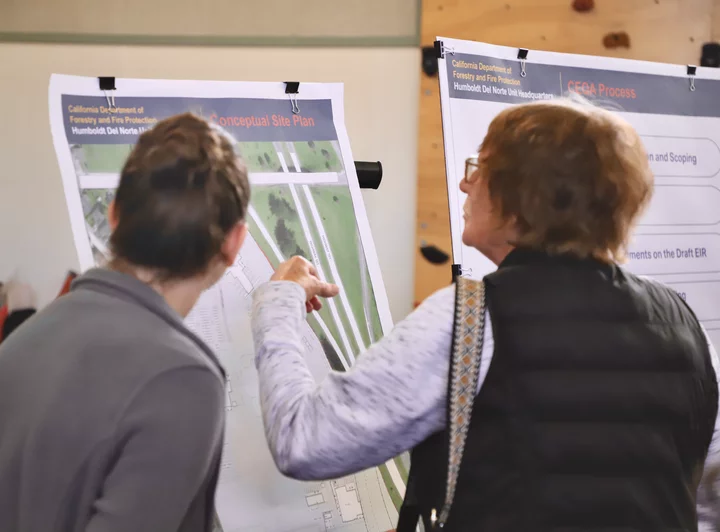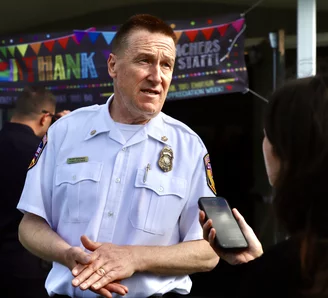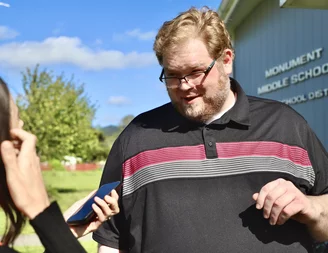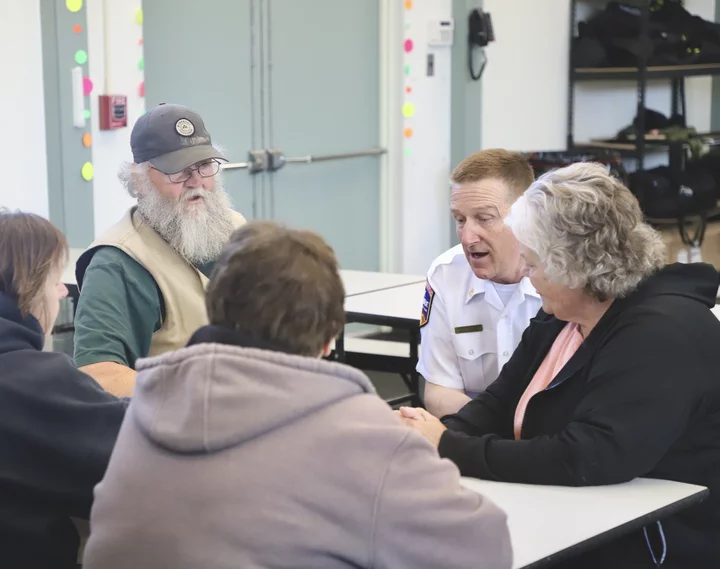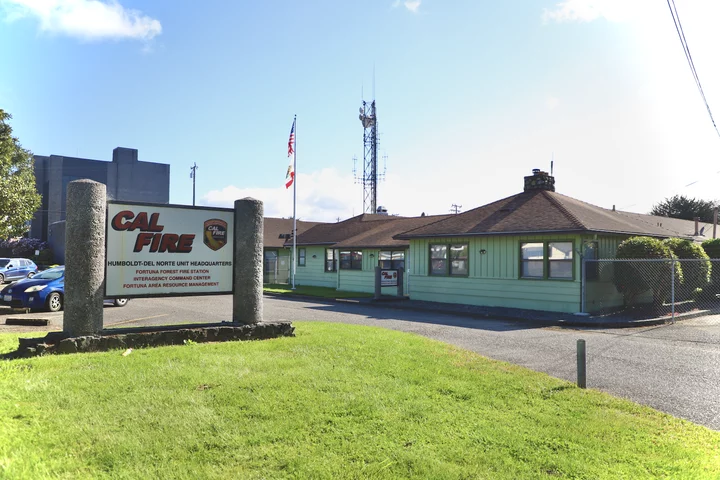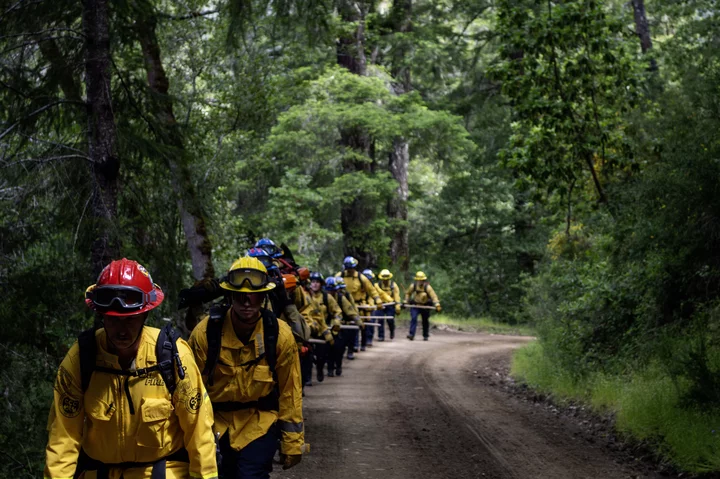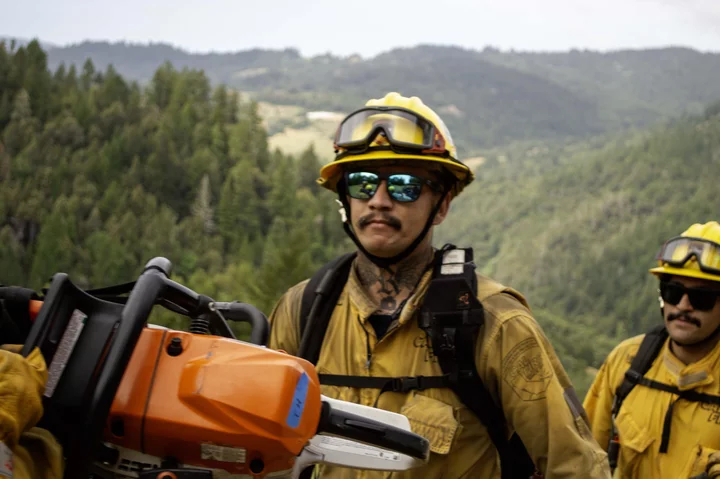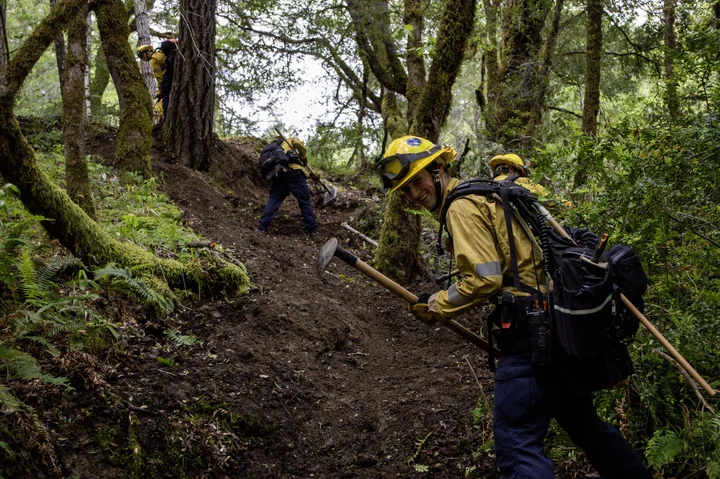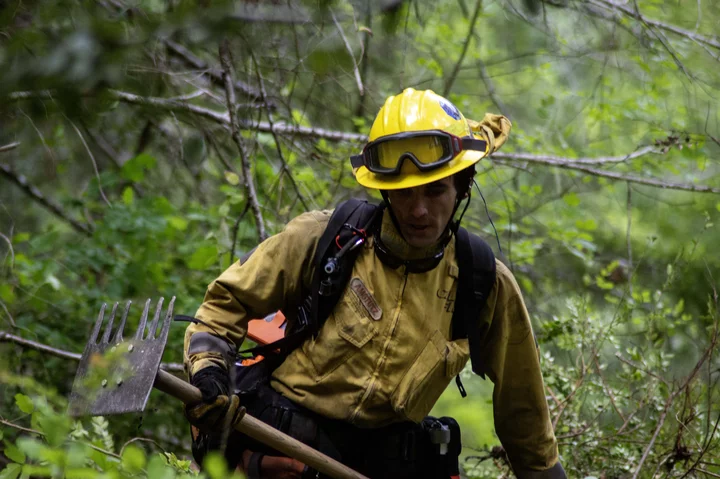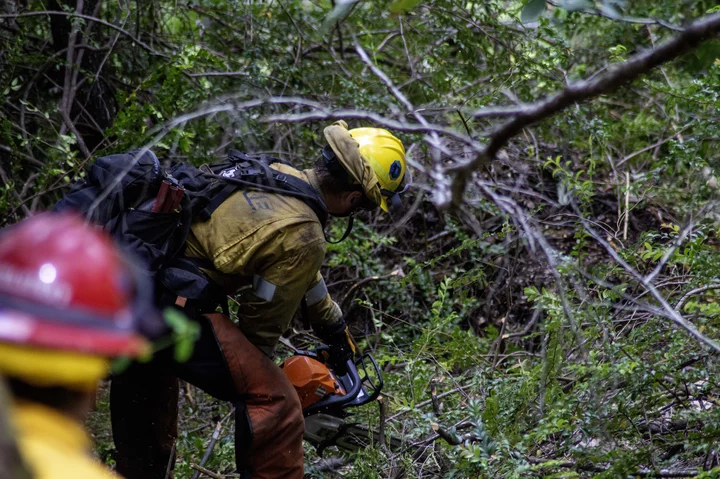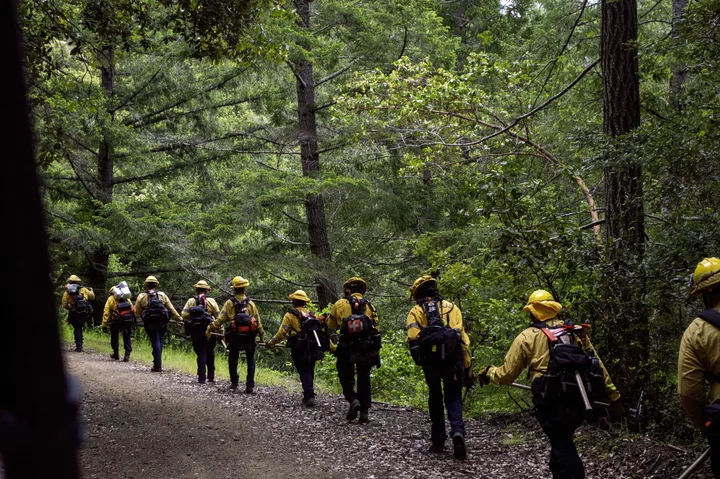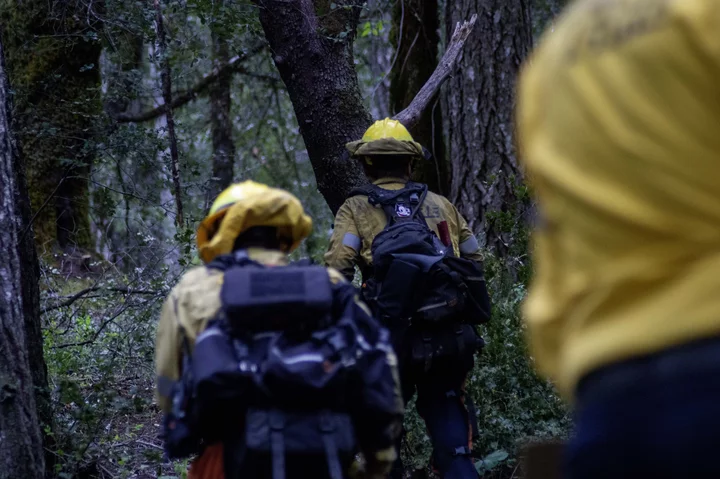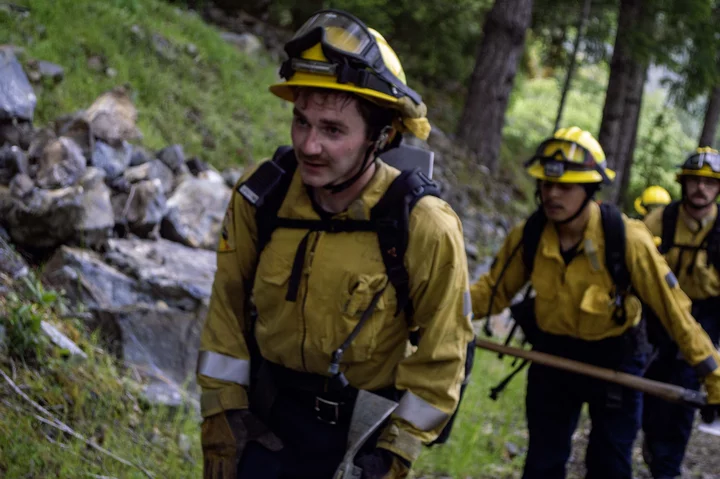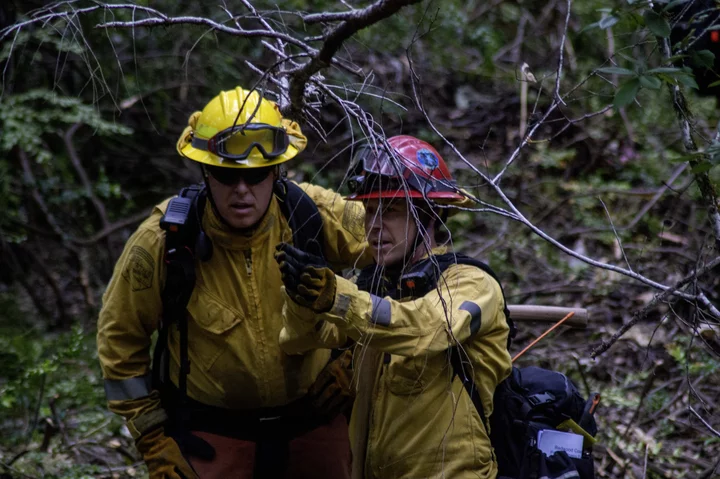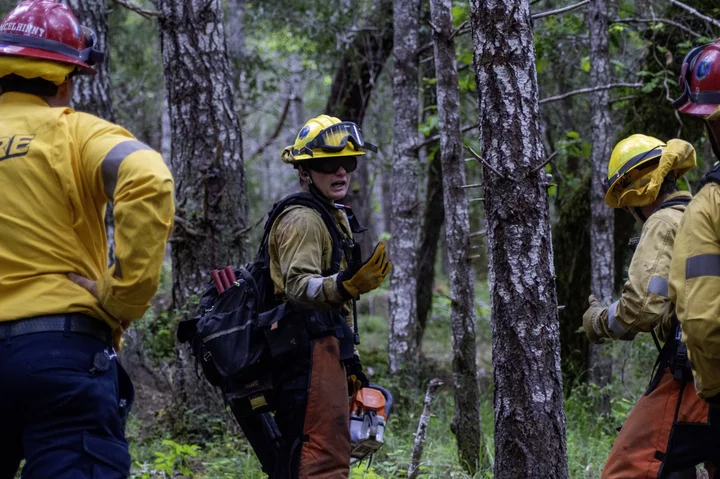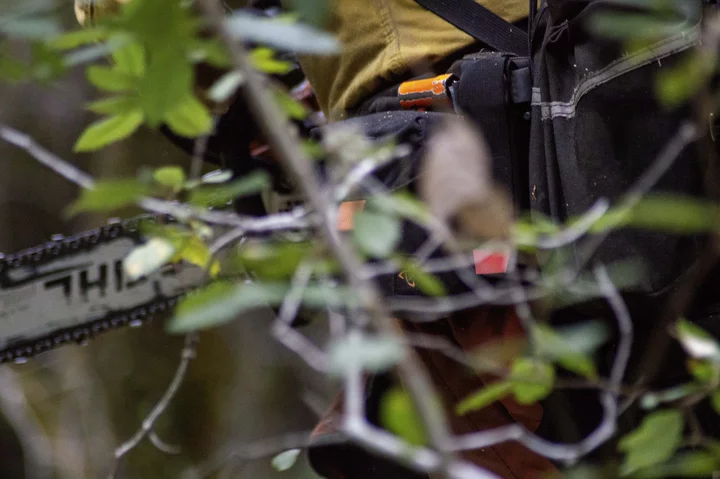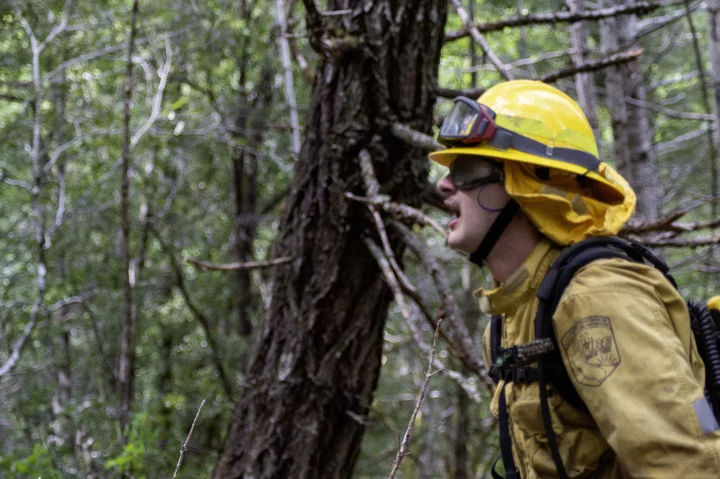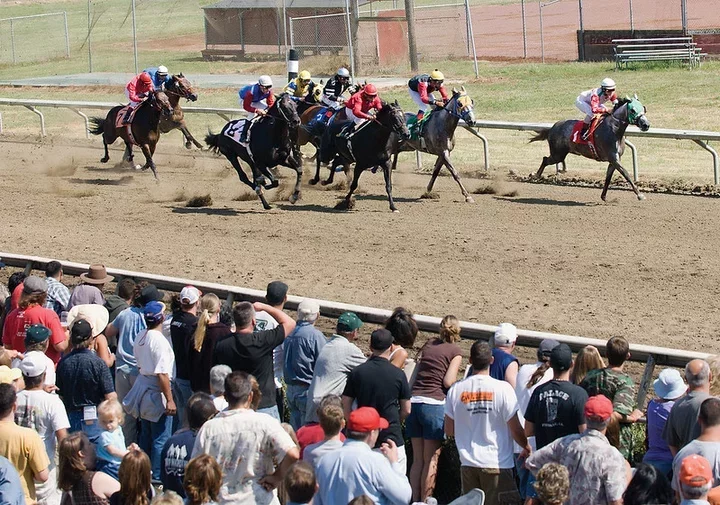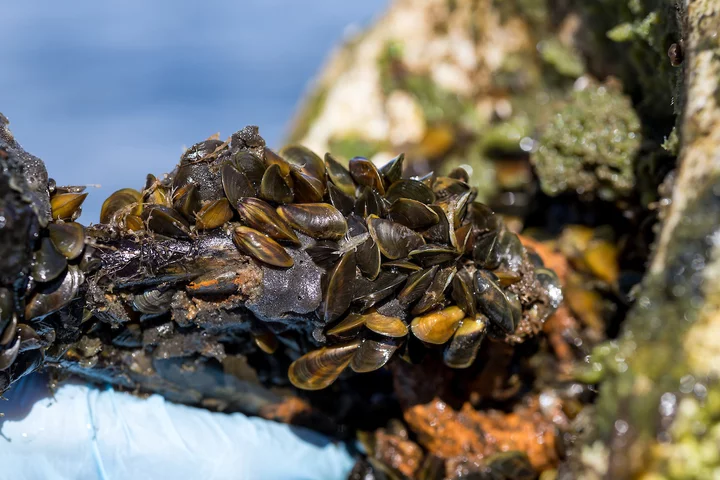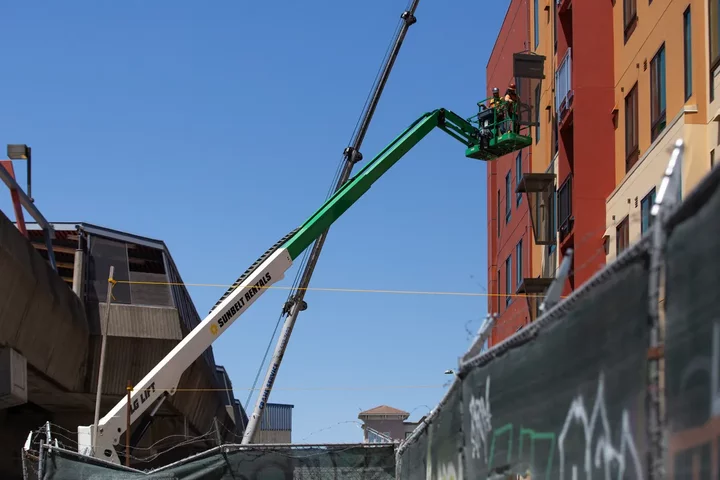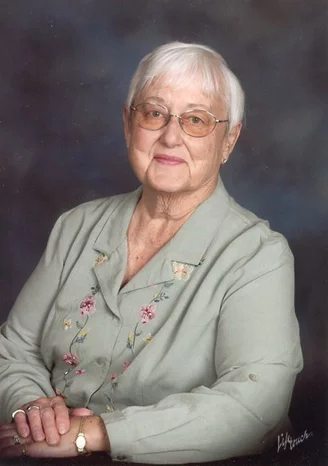At Open House, Rio Dellers Check Out Calfire’s Plans for Their Town
Isabella Vanderheiden / Thursday, May 15, 2025 @ 4:51 p.m. / Fire , Infrastructure
The 18-acre “Todd Property” is slated to become CalFire’s new regional headquarters. | Photos: Andrew Goff
###
PREVIOUSLY:
###
CalFire is moving ahead with plans to relocate its Humboldt-Del Norte Unit headquarters from Fortuna to a prime piece of highway-facing real estate in Rio Dell.
The new regional headquarters would span the entire 18-acre property — two adjoining parcels known locally as the “Todd Property,” located south of Davis Street and west of Highway 101 — quashing the city’s long-held hopes of turning a portion of the site into housing or a mixed-use development.
The city has tried to buy the property numerous times over the last 40-odd years but, for one reason or another, negotiations never panned out. After the California Department of General Services (DGS) purchased the property on behalf of CalFire in 2023, the city asked if it would be willing to reduce the footprint of the new facility and surplus a few acres at the south end of the site to help the city meet state-mandated housing requirements. The state still hasn’t provided a definitive answer.
On Wednesday evening, DGS and CalFire held a public scoping meeting at Rio Dell Elementary School to give residents a chance to learn more about the proposed project as staff prepare for the upcoming environmental review process. While there was no formal presentation at last night’s meeting, staff from CalFire and DGS were on hand to answer general questions from the public.
Rio Dell residents scope out the draft plans for CalFire’s new headquarters.
Asked if the state would be willing to surplus some of the 18-acre site to the city, Brandee Carle, project director for DGS’s real estate services division, told the Outpost that “CalFire’s management is looking at different aspects of the project” and suggested we talk to CalFire or send follow-up questions via email.
When posed the same question, Humboldt-Del Norte Unit Chief Kurt McCray declined to comment and directed our inquiry to DGS. However, he did note that the Humboldt-Del Norte Unit would likely “need the entirety” of the site to accommodate future growth.
“We have almost doubled our size in personnel in the last 10 years, and with the change we’re seeing on the landscape level with wildfires and other emergencies that we respond to, we have to ask where we’ll be in 50 years from now,” McCray said. “I struggle with trying to envision or predict what CalFire will need in 50 years, and that’s the purpose of buying a property that has that flexibility to expand.”
As one can imagine, firefighting equipment has changed quite a bit in the last hundred years. Modern fire engines can’t even fit in the repair shop at CalFire’s existing headquarters on Fortuna Boulevard, McCray said.
“The facility we are currently housed in — which was established in the 1930s and is approaching 100 years old — is just a little over three acres, and we have completely outgrown it with the increase in personnel and equipment,” he continued. “We no longer have the ability to do repairs indoors, so that has become an issue for us. … This transition to a new headquarters is absolutely needed [to accommodate] the growth of CalFire employees and expansion of our services in our region.”
Under the current plan, the two existing buildings on the property would be demolished, and the entire 18 acres would be paved over. The site plans include a fire station, administrative office, emergency command center, service center, auto shop, fitness and training facilities, as well as ample parking and storage for CalFire equipment. The draft plan also includes two acres of solar panels and 1.5 acres of stormwater retention basin.
City Manager Kyle Knopp emphasized that the city isn’t against CalFire moving its headquarters to Rio Dell, but said he was disappointed that the state hasn’t been more willing to work out a compromise.
“We just think that there’s a better way to split 18 acres, which is a lot of land, in a way that would benefit the school district, local tax revenue and job creation activities,” Knopp said, adding that the current plans conflict with the state’s mission of building up instead of out to reduce sprawl. “We just think that, with a little bit more finesse and a little bit more thinking, there could be a larger group of winners.”
Asked whether he felt the state was taking the city’s concerns seriously, Knopp said state Sen. Mike McGuire was responsive to the city’s concerns, but noted that he “isn’t convinced that the bureaucracy itself is interested in alternatives.”
“This is going to be a good project overall, but I think it could be better,” he said.
After last night’s open house meeting, the Outpost sent a few follow-up questions to DGS, but we haven’t received a response as of this writing.
Written comments on the “notice of preparation” for an environmental impact report will be accepted through May 29. More information can be found at this link.
###
McCray speaks with a group of residents at the public scoping meeting.
CalFire’s current headquarters in Fortuna.
BOOKED
Today: 6 felonies, 9 misdemeanors, 0 infractions
JUDGED
Humboldt County Superior Court Calendar: Friday, Feb. 13
CHP REPORTS
900 E Washington Blvd (HM office): Hit and Run No Injuries
1110 Tantara Ln (HM office): Traffic Hazard
0 SR36 (RD office): Chain Control
250 Mm271 S Men 2.50 (HM office): Closure of a Road
ELSEWHERE
RHBB: RV Fire Near Founders Grove
Politico Magazine: The Friday Read ‘The Industry Comes In and Kills the Work of Local Citizens’
The Guardian: Anatomy of an upset: how Ilia Malinin lost Olympic figure skating gold
The Hill: Democrats say Trump’s climate rollbacks ‘corruption in action’
(PHOTOS) Wildland Firefighters Hike, Saw and Hack Away to Prep for Upcoming Fire Season
Dezmond Remington / Thursday, May 15, 2025 @ 3:18 p.m. / Fire
Photos by Dezmond Remington.
A chainsaw symphony erupted from the hill, crawling with dozens of panting yellow-jacketed men and women working like termites to devour all plant matter straight up the face. They worked in lines a dozen long, slamming tank-like hoes into hard earth and sinewy brush, chopping up tree roots and casting everything underfoot and in the way aside. It was a full-frontal assault that, if it wasn’t a training exercise, would have ended by attempting to snuff out a wildfire with even more sweat and toil.
For the last three days, 19 fire crews from Humboldt, Mendocino and Del Norte counties have been testing their readiness for the upcoming fire season on a steep, densely wooded chunk of private property a few miles from Redway. Ten are Cal Fire crews, six are from the California Department of Corrections and Rehabilitation, two are Civilian Conservation Corps, and one is a California Military Department crew. About 230 firefighters went through the exercises, the 17th year the Redwood Coast Fire Preparedness Exercises have been held.
Firefighter crews complete several tests to judge how prepared they are for the fire season. Each 12-person crew must walk three and a half miles up a 1,200 foot hill while wearing all 40-50 pounds of their gear in less than 70 minutes. They then have to chop fire lines up another, even steeper hill through a dense forest. The lines have to be free of debris and major stumbling blocks, and firefighters are evaluated on factors like how spaced out they are while they hack away and how well they work together.
It’s an important part of the process to get firefighters ready for the incredibly strenuous work integral to wildland firefighting, and usually the prep work is just as hard as the actual ordeal. It was over 90 degrees during last year’s readiness exercises, though yesterday it barely cracked 60. According to Cal Fire battalion chief Jeremy Ward, besides simply testing their fitness, these preparedness exercises help keep firefighters safer and aware of threats while they’re battling actual blazes.
Various higher-ups stood and watched the “hand crews”, as the chainsaw- and hoe-wielding firefighters are called, create their fire lines. They compared the merits of having a full pot of hot coffee ready at all times of day in the camp kitchen and joked about how difficult it could sometimes be to parse Cal Fire’s driving instructions (“‘Take the driveway with the gate on it,’ I once got told,” said one experienced firefighter. “I’m driving [Highway] 299 at night. Every driveway has a gate on it!”), but one topic that came up over and over again was the increasing length of the fire season. When battalion chief Shane Lamkin started working with Cal Fire in the late ‘90s, the seasonal workers that make up the bulk of their reserves were lucky if they worked five months out of the year. Now, most crews could easily work for nine and might work even more if there’s an emergency.
“It’s almost year-round now,” Lamkin said. “Remember [Pacific] Palisades? In January? It’s crazy.”
Though many senior firefighters are hopeful that might change eventually, they’re hedging their bets by trying to make all of their crews as hardy as possible, an effort that shows in the thousand-yard stares of the dozens of people lugging huge loads of tools and safety gear up the mountain, powering up vile terrain for a chance to slam some Gatorade and chew a few Clif Bloks.
[UPDATED] There Will Be No Horse Racing at This Year’s Humboldt County Fair
Ryan Burns / Thursday, May 15, 2025 @ 12:09 p.m. / Breaking News
Horse racing at the Humboldt County Fair. Photo: Redwood Coast, via Flickr. Creative Commons license.
###
PREVIOUSLY
- REPORT: Horse Racing at the Humboldt County Fair is Still Just Barely a Possibility, Following Today’s Meeting of the Racing Board
- THE FINAL STRETCH: Humboldt County Fair Urges Community to Stand Up and Make Noise in Support of Horse Racing
###
A few minutes ago, the California Horse Racing Board voted 4-3 to deny a request from the Humboldt County Fair Association to approve three weeks’ worth of horse racing dates for the Humboldt County Fair in Ferndale this August.
The decision, which appears to represent the end point of a total collapse of sanctioned horse racing in Northern California, brings a halt to 129 years of horse racing at the Humboldt County Fair.
The board’s vote came despite letters of support from numerous elected officials, including Rep. Jared Huffman, California Senate President Pro Tem Mike McGuire and Assemblymember Chris Rogers, as well as celebrity chef Guy Fieri, a Ferndale native.
This story will be updated with details from the meeting.
###
UPDATE, 3:28 p.m.:
California’s horse racing industry has struggled mightily in recent years amid dwindling attendance, stagnant purses, competition from online sports gambling and public concerns over animal welfare, among other factors.
Golden Gate Fields in Berkeley closed last summer after 83 years. Golden State Racing, a consortium of owners, breeders and trainers, was formed in an effort to fill the void. But following a $1 million fiscal loss at its first meet, the entity collapsed. Late last year, the California Authority of Racing Fairs (CARF), a joint powers authority representing all Northern California fair meets except Santa Rosa’s, announced that it would not pursue any horse racing applications this year, though it said individual county fairs could apply on their own.
So the Humboldt County Fair Association (HCFA) did just that, and a number of influential locals made the drive to Sacramento to appeal directly to the CHRB today, to no avail. HCFA Board Chair Andy Titus and attorney Jim Morgan led the association’s presentation, arguing passionately on behalf of the longstanding local tradition.
Their business plan involved partnering with a newly formed company called Bernal Park Racing, LLC, which is generously financed by wealthy racehorse owner George Schmitt and owner/breeder John Harris. According to Humboldt County Supervisor Rex Bohn, that duo had offered to put $1.5 million in the bank to finance the local horse racing bid.
“I feel like the team in Humboldt is the voice for the North; Bernal Park racing is the voice for the North,” Titus said to the California Horse Racing Board. He said that the $1 million that would be handed out in purses (a figure based on last year’s record proceeds) would go a long way toward supporting the trainers, owners and breeders in NorCal while providing an essential social and economic boost to the region.
Schmitt said he and Harris have put their money where their mouth is, adding, “We believe that it’s critical, not just for horse racing, but for the fairs themselves to succeed.”
Morgan sought to assure the board of the security of the HCFA’s business plan, saying that unlike Golden State Racing, the Humboldt County Fair is an independent, county-owned operation with 129 years of successful horse racing.
“Last year was the first time that we had three weeks without overlap, without shared commissions,” Morgan said. “We generated approximately $1 million in commissions and purses. … And the million dollars in commissions is sufficient to sustain an independent racing venue.”
Morgan compared the economic impact in Humboldt to that of the Kentucky Derby in the Bluegrass State. Come fair time, he said, “The hotels are full, the restaurants are full, the shops are full. The supervisors of our county have estimated that over $7 million in revenue goes to this county for this fair, hosted in a town of 1,500 people, in a county of 130,000 people. It’s huge for the economic impact of this community.”
He also sought to reassure the board that racing at this end of the state would not represent a threat to operations at Del Mar, which is as far away from Ferndale as it is from El Paso, Texas.
But board member Dennis V. Alfieri remained unconvinced. “You have an unknown entity, an unknown operator,” he said. “I’m concerned about operations, this willy-nilly put things together — I’m very concerned. I’m uneasy with this entity.”
Bill Nader, president and CEO of Thoroughbred Owners of California (TOC), argued against board approval of race dates in Ferndale. His organization’s stated mission is to “maximize purse revenues and preserve the long-term viability of our sport,” and he said California has limited resources.
“We need to be very careful with how we govern and how we go forward to protect and preserve California racing,” Nader said, noting that the industry’s income in the state comes entirely from parimutuel wagering.
His organization is not anti-Northern California, he insisted, but the results speak for themselves.
“I think we can all agree that the decision to license Golden State Racing for race dates last year was a sincere attempt to give the North an opportunity to see, beyond a shadow of a doubt, how the market would respond,” he said. “Now we know the results, and it wasn’t pretty.”
He argued that the industry needs to focus all of its efforts in Southern California for the time being as a matter of simple survival.
“We are not playing with house money; there is no house money,” Nader said. “The California horse racing industry, at every corner, is fighting to survive, fighting to rebuild, fighting to regain its status. And here in 2025 we are now doing that.”
Nader argued that most horseracing professionals have already made the transition to Southern California, and he said the industry needs to focus on the newly formed consolidated California Circuit, rather than sharing any revenues.
“While we all appreciate the great attributes of the Humboldt County Fair, we cannot support a transfer of funding from the California horse racing industry participants to the Humboldt County Fair — not now, when we are finally moving in the right direction … ,” Nader said. “Consolidation was not really a choice for California racing. It was driven out of desperation. The North and South were sinking and sinking fast when compared to other states across the country. The downward spiral was real, and it had to be reversed.”
After a brief break, the board allowed public comment, and nearly all of it was in favor of Humboldt County’s bid.
Bohn read a letter from Guy Fieri, who wanted to appear in person but was filming in Texas, according to Bohn. Fieri’s letter spoke to the “beautiful tradition” that has become part of the fabric of Humboldt and surrounding counties.
“To put it very bluntly, taking this meet away from Ferndale could be a bullet to the heart of the fair and our community,” Bohn quoted from the letter.
For his own part, Bohn rejected the implication that the Humboldt County Fair is insignificant. “The hell we are,” he said, adding that it was this end of the state that launched a breeding program for racehorses.
Humboldt County Fair Association board member Cindy Olsen told the board, “Today is the most important day of the Humboldt County Fair’s 129 year history,” adding that our local fair is “the smallest racing fair with the biggest heart.”
Second District Humboldt County Supervisor Michelle Bushnell also appeared in person. “The horses are not just athletes to us,” she said. “They are family members, companions and partners in our journey. We cherish the bond we share with them and with our neighboring horse racing community.”
Bushnell told the board about how she and her fellow supervisors approved a $1 million funding request for emergency repairs to the fairground grandstands, which were damaged in the December 2022 earthquake. (The county was later reimbursed by California Governor’s Office of Emergency Services with just over $836,200 of that amount, reducing the county’s contribution to about $164,000.)
“This is about more than just horses running around a track,” Bushnell said. “It’s about creating jobs, supporting local businesses and encouraging families to participate in a tradition that has been part of our identity for so long.”
Trainers, owners and breeders also spoke to the importance of the Ferndale races, with owners saying horses at their stable operations have been leaving the state, creating a downward trend in breeding that could lead to disaster not just for “horsemen” in Northern California but the entire state.
Late in the hearing, word came to the board that Senator McGuire was on the phone and hoping to address them, but legal counsel said that since the meeting had been agendized as an in-person event, such communication was not legally permissible.
When the board finally cast its votes, three “no” votes came first (from board members Thomas C. Hudnut, Damascus Castellanos and Alfieri), followed by three “yes” votes (Peter Stern, Brenda Washington Davis and Oscar Gonzales), leaving Chair Gregory L. Ferraro as the decided vote.
“Chairman votes no,” he said.
Reached by phone after the meeting, Bohn said the result was disappointing, to say the least.
“Del Mar controlled it,” he said, adding that an antitrust lawyer in Philadelphia will “look everything over” and see if there’s a legal case that might salvage the efforts to save horse racing at the Humboldt County Fair. But he admitted that all remaining efforts have a snowball’s chance of success, at this point.
“I was really proud to represent Humboldt and [of] all the people who showed up and talked about the 129-year tradition,” Bohn said. “It’s disheartening because there were people [on the board] who already had their mind made up. There were a couple we thought we could sway but we didn’t. It’s just sad. I was proud of Humboldt for showing up.”
This Summer, Let’s All Do Our Part to Keep These New, Nasty, Invasive, Infrastructure-Destroying Mussels Out of Ruth Lake
LoCO Staff / Thursday, May 15, 2025 @ 11:28 a.m. / Environment
Fuck these mussels. Photo: California Department of Fish and Wildlife.
Press release from the Humboldt Bay Municipal Water District:
Before enjoying Ruth Lake this summer, be sure to Clean, Drain and Dry all watercraft including kayaks, canoes, paddle boards, rafts, boats and trailers to prevent the spread of the recently introduced aquatic invasive species, the golden mussel. The golden mussel, native to East and Southeast Asia, was first documented in California in October 2024 and is spreading throughout the Sacramento-San Joaquin Delta at an alarming rate. The golden mussel is capable of rapidly spreading, wreaking havoc on ecological health and threatening water infrastructure and quality at a much more aggressive rate than the quagga and zebra mussels.
Golden mussels easily spread to new habitats from watercraft and trailers. You might unintentionally transport their microscopic larvae in water held in your boat’s ballast tank or bilge.
Ruth Lake, impounded by Matthews Dam on the Mad River, serves as the drinking water source for the majority of Humboldt County. The dense colonization of golden mussels would threaten operations of Matthews Dam, threatening Humboldt County’s water supply. The lake is also a favorite recreational destination for Northern Californians. Access to Ruth Lake is controlled by the Ruth Lake Community Services District in partnership with the Humboldt Bay Municipal Water District. If boaters fail to take necessary precautions to protect Ruth Lake from the golden mussel, public access to Ruth Lake may be closed.
California Department of Fish and Wildlife officials say “Based on the water quality data, Ruth Lake definitely has high enough calcium levels to support golden mussel establishment if they are introduced. Ruth has the correct calcium, pH, dissolved oxygen, and temperatures for their survival and reproduction.”
“To ensure Ruth Lake remains open to recreational use, boaters must do their part to protect Humboldt County’s water source by cleaning, draining, and drying all watercraft equipment — from power boats to stand up paddle boards — prior to entering the lake,” said Michiko Mares, General Manager at the Humboldt Bay Municipal Water District.
“Across California, public access to recreational waters are being closed because of the risk of spreading golden mussels. Please be responsible to keep Ruth Lake open to our community for recreational purposes and to assure our water source is protected.”
“Before your watercraft can enter the lake, it must be inspected. Prior to arriving at Ruth Lake, be sure your watercraft is completely cleaned, drained, and dried. Inspections are available at the Ruth Lake Marina, seven days a week from 7am to 7pm or at the Ruth Recreational Campground, seven days a week from 8am to 8pm” said Caitlin Canale, General Manager of the Ruth Lake Community Services District.
Humboldt Bay Municipal Water District and Ruth Lake Community Services District are working closely with state and federal agencies and other water managers to track the spread of the golden mussel, monitor boat traffic, inspect watercraft, and prepare long-term plans in the event the golden mussel is introduced into Ruth Lake.
For any questions please call: Ruth Lake Marina: 707-574-6194
Ruth Rec Campground: 707-574-6196
Please visit the RLCSD website for more information.
Newsom Picks More Housing Over CEQA in Backing Two Bills Meant to Speed Construction
Ben Christopher / Thursday, May 15, 2025 @ 7:20 a.m. / Sacramento
Construction on Casa Sueños, an affordable housing complex at 3500 E. 12th St. in Oakland, on Aug 7, 2023. Photo by Semantha Norris, CalMatters
###
This story was originally published by CalMatters. Sign up for their newsletters.
###
The effort by two Bay Area lawmakers to exempt most urban housing developments from the state’s premier environmental regulation — an idea that has drawn some of the state’s most powerful interest groups into a fierce legislative debate — just received a prized endorsement from Gov. Gavin Newsom.
While announcing his updated budget proposal for the coming fiscal year, the governor urged the Legislature to pass two housing bills and thanked their Democratic authors, Oakland Assemblymember Buffy Wicks and San Francisco Sen. Scott Wiener.
“It’s time to get serious about this issue, period, full stop,” Newsom said this morning. “If you care about your kids you care about getting this done. This is the biggest opportunity to do something big and bold and the only impediment is us.”
Wicks’ Assembly Bill 609 would exempt most “infill” housing developments, projects built in or next to existing developments, from review under the California Environmental Quality Act. That 55-year-old statute requires governments to study the environmental impact of any decisions they make, including the approval of new housing. Any person or organization — construction worker unions, environmental advocates or neighborhood groups, to name a few — can challenge the validity of those studies, delaying approval.
Critics of the law argue that it is regularly abused for non-environmental reasons to delay urban housing projects which are inherently better for the environment than sprawl development. Defenders of the law say such lawsuits are relatively rare.
Wiener’s Senate Bill 607 is a highly technical grab bag. Among other things it would make it easier for state and local governments to approve projects — housing and otherwise — without conducting a full, lengthy review and exempt certain zoning changes for infill projects from CEQA entirely.
Newsom said that he would include language that mirrors those policy goals in upcoming budget bills.
“These bills are critical permitting reform proposals, and I applaud Gov. Newsom for including them in his proposed budget,” Wiener said in a statement. “By clearing away outdated procedural hurdles, we can address California’s outrageous cost of living, grow California’s economy, and help the government solve the most pressing problems facing our state.”
The governor also published proposed legislative language that would channel certain environmental impact fees collected from development projects toward the construction of new affordable housing located near public transit stops. That mirrors another bill authored by Wicks.
That proposed legislation would also give the California Coastal Commission, a frequent target of pro-development legislation, a deadline for responding to project proposals.
This isn’t the first time the governor has weighed in on the landmark environmental law. Two times in as many years, the administration has urged the Legislature to tinker with the law to make it easier to build infrastructure projects and to expand the state’s renewable energy capacity.
The Legislature hasn’t always listened and the prospect of comprehensive “CEQA reform,” a goal regularly touted by California governors and resisted by environmental groups and many unions, remains elusive.
Those earlier legislative efforts were “weak sauce” and “piddlywinks,” these bills represent much more substantive change to housing and environmental policy, said Chris Elmendorf, a UC Davis Law professor and frequent public critic of CEQA.
“The fact that the governor is willing not just speak in generalities, not just have Ezra Klein on his podcast, but to endorse specific bills and even go beyond endorsing them by tying them to his budget and putting pressure on the Legislature, that, I think is a very big development that we haven’t seen previously from this governor,” he said.
His nod to these two bills comes at a politically important time. Wicks’ bill has sailed through the Assembly so far with the explicit backing of Speaker Robert Rivas. Wiener’s bill has made its way through one committee, but only barely and over the objections of that committee’s chair.
Both Legislative leaders have vowed to prioritize legislation that promotes “affordability.” Rivas, closely allied with the “yes in my backyard” movement, has publicly endorsed a suite of bills aimed at reducing regulations and speeding up approvals for new housing. McGuire, tasked with wrangling a Senate Democratic caucus with public fractures over housing policy, has been more reluctant to articulate the specifics of his housing agenda.
OBITUARY: Patricia Marie McNamara, 1938-2025
LoCO Staff / Thursday, May 15, 2025 @ 7:01 a.m. / Obits
The family of Patricia Marie McNamara are sad to announce her passing.
Born in 1938 to Ina and Corrado Pinochi, raised in Eureka along with her twin sister, Paula, sister, Teresa and brother Corrado, Jr. (Joe). Graduated from St. Bernard’s Elementary and on to Eureka High. Pat became an active student there, cheerleading alongside her sister. She was a member of the swim team, and performed water ballet. Pat also participated in swim meets at the Freshwater pool. She liked to go with Dad to any and all Kiwanis events.
She graduated from EHS and started classes at Humboldt State while working for Eureka Chamber of Commerce and Dr. William Moon, DDS. Her best summers were spent at the family cabin at Redway, California, swimming, diving and sunbathing!
Pat became Mrs. James Carlson and was married for 34 years. She and Jim raised three boys — James Jr. (wife Zohreh), Scott Joseph (deceased) and Jeffrey (wife Caryn). These boys all excelled in sports, which started her life as a sports enthusiast. She and Jim were perpetual volunteers in Sacramento baseball leagues, St. Charles Borremeo, as well as Christian Brothers. They would prep the field, work in the snack bar or anywhere else there was a need. God took Jim Sr. way too soon but Pat continued her support of her children and their activities.
Pat then married Joseph McNamara. Pat became known as “Auntie Mom” to Joe’s son, Michael, and daughters, Jolene, Missy and Jonell. She was blessed with two grandsons by Jeff and Caryn, Dylan and Tanner. They were excellent athletes so Pat got to continue her calling as a sports enthusiast. She enjoyed watching her grandsons play ball. When her second husband was called to God, she began living (independently) in the home of her niece, Lynn (the daughter she never had) and her husband Greg. She loved being part of that life, following her great nephew, Jayden, in whatever sport season it was! Her activities included bowling, playing Pinochle with her twin sister, Paula, Bill (Paula’s husband) and Anita (Lynn’s mother-in-law). Pat and Anita also had weekly trips shopping in Anita’s HumVee. Imagine the surprise of anyone seeing those two “seniors” get out of that huge vehicle! Patricia treasured her trips to Tuscany, Italy to visit with the Italian side of her father’s family, the Pinochis and DelGrandes.
Pat is survived by her sons, Jimmy and Jeff, their wives, and the McNamara clan. Also, surviving her is her twin, Paula Fredrickson (husband Bill Brooke), sister, Teresa Levin (Marc), brother Corrado, Jr. “Joe” (wife Mona). Several nieces and nephews: Lars Fredrickson (Donna), Lynn Fredrickson (Greg), Kevin Fredrickson (Denina), Karen Jadro (Jon), Cory Pinochi (Haley), Casey Pinochi (Karen), Blake Spiering (Ava), Brett Spiering, Andrew Spiering, Brett Marshall (Kristy), and many cousins survive her (here and in Italy). Pat was predeceased by son, Scott, and husbands James Carlson, Sr. and Joseph McNamara. Dear Patricia, rest in peace. You always wanted to be loved. You now know you are and will always be!
Graveside serviced pending under the direction of Goble’s Mortuary.
Graveside services as 10 a.m. Wednesday, May 21, at St. Bernard’s Cemetery. Gobles is having a viewing at 8 a.m. on that date at their mortuary. A reception will follow at the home of Joe and Mona Pinochi.
###
The obituary above was submitted on behalf of Pat McNamara’s loved ones. The Lost Coast Outpost runs obituaries of Humboldt County residents at no charge. See guidelines here. Email news@lostcoastoutpost.com.
OBITUARY: Cynthia Acre Ziegler, 1931-2025
LoCO Staff / Thursday, May 15, 2025 @ 6:56 a.m. / Obits
Cynthia Acre Ziegler, a devoted educator, passionate genealogist, and beloved member of her community, passed away peacefully on Saturday, April 26, 2025, in California, surrounded by family and friends.
Cynthia was born and raised in WaKeeney, Kansas, and attended WaKeeney Grade School, just half a block from her home. She graduated from Trego Community High School on May 25, 1949. During her school years, she was an enthusiastic participant in the Honor Society, Band, Glee Club, Latin Club, Junior Play, and Forensics.
Tragedy struck the summer after graduation when her father, Albert Hamilton Acre, passed away unexpectedly. Cynthia postponed her college plans to remain at home with her mother, working at Acre-Hendricks Furniture Store for a year. She then enrolled at the College of Emporia in the fall of 1950, completing her coursework in 1953. While in college, she was active in the Chorale, Modern Language Club, and Currents Events Club. She also studied at Fort Hays State during the summers of 1951 and 1952 and toured Europe in 1953.
Cynthia began her teaching career in the fall of 1953 at Avondale School in Topeka. It was there she met Bill Ziegler through a mutual acquaintance. Despite his teasing remarks about her Europe slides, a romance blossomed, and they married on December 4 the following year in WaKeeney.
She devoted several years to raising three children and traveling with Bill. In 1974, Cynthia returned to school, earning her master’s degree in Library Science from Emporia State College in 1977. She went on to serve as librarian at Lafayette Elementary School in Topeka for 22 years, retiring in 1996.
Cynthia and Bill moved to Thornton, Colorado, in July 1996, where she remained active in her many passions: genealogy, quilting, gardening, and music. In later life, quilting became a mission, resulting in an astonishing number of beautiful tapestries cherished by family and friends. She contrasted this artistic passion with a thirst for the wild side, often seen cycling a little too fast in the foothills of the Rocky Mountains with her family — always ready for a bit of fun and adventure.
She was a dedicated member of the First Presbyterian Church in Topeka for over 40 years, serving in various roles including Session member, Sunday and Bible School teacher, and participant in both the choir and hand bell choir. In Colorado, she continued her service at Westminster Presbyterian Church as a choir member, hand bell player and Deacon.
Cynthia was also an engaged member of Kansas NEA, Delta Kappa Gamma (Zeta Chapter), the Topeka Genealogical Society, the Martin County (IN) Genealogical Society, and the Adams County Quilt Group.
For her final move, Cynthia was enticed to California by her daughter Gretchen, who designed a custom room in her home with peaceful views of her beautiful garden. It was there, filled with love and comfort, that Cynthia spent her final days.
Cynthia was preceded in death by her sister Gretchen, father Albert, mother Grace, and husband Bill. She is survived by her children: Mark, Kurt, and Gretchen, her grandchildren: Katelyn, Heidi, and Zoe, and her great grandchildren: Harlan, Noah, and Neve.
A celebration of her life will be held at her home and garden in Eureka on Sunday, June 8th. In lieu of flowers, donations may be made to Sequoia Park Zoo or Hospice of Humboldt.
###
The obituary above was submitted on behalf of Cynthia Zieger’s loved ones. The Lost Coast Outpost runs obituaries of Humboldt County residents at no charge. See guidelines here. Email news@lostcoastoutpost.com.

